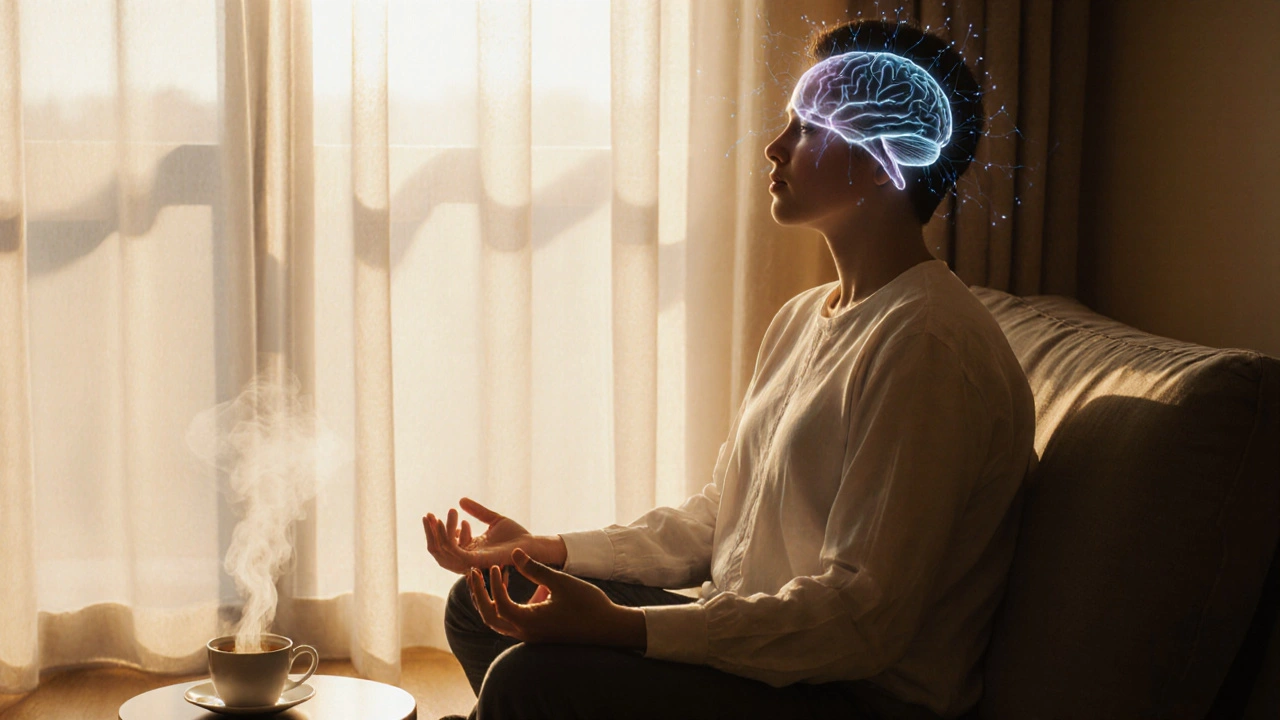Meditation: Practical Ways to Calm Your Mind Today
You don’t need a temple or an hour to get real benefits from meditation. Short, simple sessions can lower stress, help you sleep, and make tough moments easier to handle. This page gives clear steps you can use now, plus quick fixes for common problems.
Start small. Sit comfortably, close your eyes, and focus on your breath for one minute. Breathe in slowly through your nose for four counts, hold one count, and exhale for six. Repeat four times. That short cycle resets the nervous system and helps you feel less reactive.
Use a simple anchor. Pick one thing to focus on: breath, body sensations, or a single word like “easy.” When your mind wanders, notice it without judging and gently return to the anchor. No need to force silence—thoughts will come, and that’s normal.
Quick start: 5-minute routine
Set a timer for five minutes. Try this step-by-step: 1) Sit or lie down. 2) Do three slow full breaths. 3) Scan your body from head to toes, relaxing each area. 4) Spend the rest of the time following your breath. If your mind jumps, label the thought (“thinking”) and come back. Finish with a slow stretch and notice how you feel.
Try this routine in the morning to set a calmer tone or before bed to unwind. Many people find consistency beats length—five minutes daily works better than one long session once in a while.
Common roadblocks and fixes
Thoughts feel out of control. Fix: Give them a short label—“planning,” “worry”—then return to the breath. Falling asleep during meditation. Fix: Switch to seated practice or try an energizing breath (inhale quick, exhale long). Feeling restless. Fix: Try walking meditation—move slowly and notice each step.
Want variety? Mix techniques: guided meditations, body scans, breathwork, or mindful walking. Use apps or short videos when you need structure, but don’t rely on them every time. The goal is simple practice you can do anywhere.
Keep track. Write one line after each session: time, what you did, and one word about how you felt. Over weeks you’ll see patterns—what helps you sleep, what reduces anxiety, and what fits your schedule.
If you have health concerns, check with a professional before trying intense breathwork or long silent retreats. For most people, short daily practice is safe and helpful.
Pick one small step today: one minute of breath, a 5-minute routine, or a walking pause. Small, consistent choices add up fast and make stress easier to handle.
If you want to deepen practice over time, add a tiny habit: stack meditation onto something you already do (after brushing teeth or before coffee). Increase time by one minute every week. Keep sessions varied—use body scan one day, breath counting the next, walking on weekends. Track nights you sleep better and note what helped. Over a month you’ll see small gains in focus, mood, and sleep. That slow buildup keeps practice enjoyable and real.
Start small and stick with it.

How Meditation Improves Memory, Focus, and Brain Power
Meditation boosts memory, focus, and decision-making by physically changing your brain. Just 10 minutes a day can reduce mental clutter and improve cognitive performance-backed by neuroscience.

How to Start Meditating: The Ultimate Beginner’s Guide for Calmer, Happier Living
Ready to find some peace? This beginner’s guide covers exactly how to start meditating, plus practical tips, easy methods, and useful facts for real-life mindfulness.

Meditation and Mindfulness: How They're Linked and Why It Matters
This article dives into how meditation and mindfulness connect, breaking down what sets them apart and where they overlap. Get clear, practical advice on starting a meditation practice and how it can boost mindfulness in everyday life. Find out what happens in your brain when you meditate and why tiny moments of awareness can reset your mood. Packed with tips and real-life examples, this guide shows you how to keep both meditation and mindfulness simple, realistic, and actually helpful. Anyone looking to stress less or focus more will find useful ideas here.

How Meditation Techniques Boost Your Sleep Quality
Meditation has long been heralded for its myriad benefits, with improving sleep quality emerging as a standout advantage. This practice can train your brain to embrace relaxation more naturally, which can significantly ease the process of falling asleep. By dedicating a few moments each day to meditation, you might find yourself drifting off into dreamland with newfound ease. Beyond its calming effects, meditation enhances your ability to maintain a sound, uninterrupted sleep cycle. Delve into various meditation techniques and how they can enhance your nightly rest.

Meditation's Role in Boosting Emotional Well-being
Meditation has gained recognition as a powerful tool for enhancing emotional health. The practice of meditation helps individuals manage stress, improve mental clarity, and foster a more positive outlook on life. By engaging in mindful meditation, people can develop a deeper understanding of their emotions and learn to respond to life's challenges with greater calm and resilience. This article delves into the transformative connection between meditation and emotional well-being, offering insights and tips for incorporating meditation into daily routines.

Essential Guide to Meditation in Today's Hectic World
In our fast-paced modern world, meditation is becoming more essential than ever. This article explores the importance of meditation, its numerous benefits, and practical tips to incorporate it into daily life. Discover how this ancient practice can significantly improve mental health and help manage stress effectively.

Discovering Hakali: A Traveler's Hidden Gem
Feb, 28 2025

Revitalize Your Skin with Gua Sha Techniques
Jun, 25 2024


